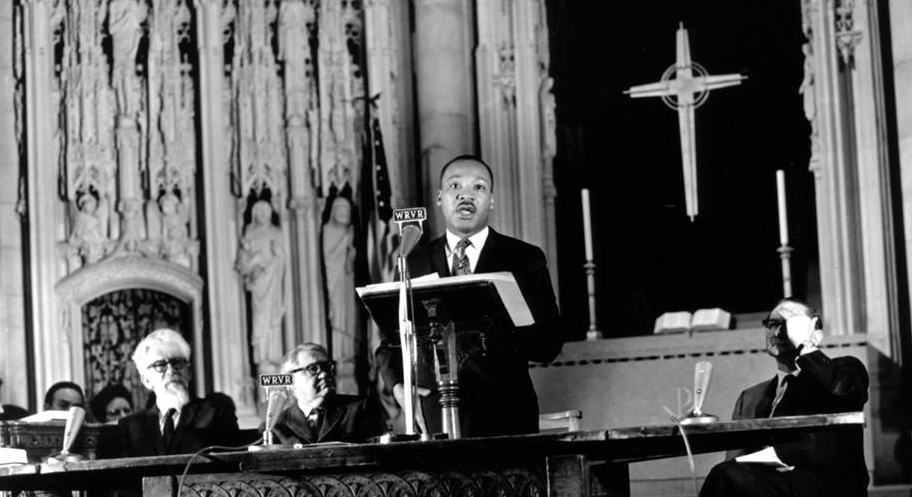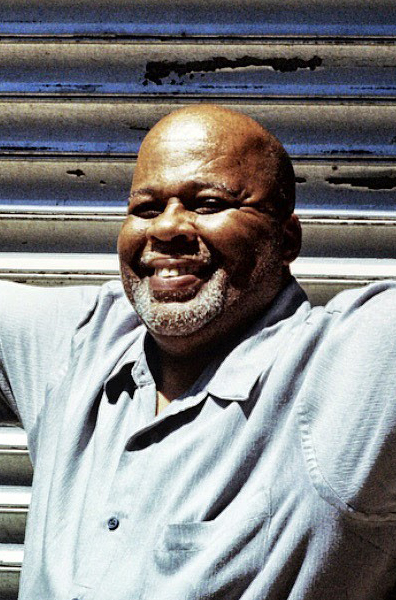
Rev. Dr. Martin Luther King Jr. delivers his "Beyond Vietnam" speech at the Riverside Church in New York. Photo: Public domain Archives / AFSC
For many years I have worked with AFSC’s healing justice network to end mass incarceration and build systems that actually support the well-being of our communities. Today, I am reminded of how Rev. Dr. Martin Luther King’s words and spirit continue to provide me with guidance and inspiration in my efforts to defend the human dignity of all. The work of healing justice calls us to set aside our individual sense of comfort for a collective sense of justice. That is the challenge King presented to us when he said, “An individual has not started living until he can rise above the narrow confines of his individualistic concerns to the broader concerns of all humanity.”
Laura Magnani, my friend and former AFSC colleague, has often reminded me that rather than a system based on violence and punishment, what is needed is a way to address the harm that has been done and hold all parties accountable. We must evolve from a punishment system that has functioned as a tool to support the legacy of colonialism, racism, and imperialism that is so deeply rooted in U.S. culture to one of truth telling and repair.
In his Nobel Peace Prize acceptance speech, King said “Man must evolve for all human conflict a method which rejects revenge, aggression and retaliation. The foundation of such a method is love.” What a clear challenge to the punishment paradigm that incarcerates so many, sentencing people to death by incarceration and executing others in our name. King is calling us to evolve, to imagine a different approach to conflict, one that promotes healing and is grounded in love.
Dr. King also reminds us that we must take courageous action in order to realize our visions of a more just world. In 1968, King said “[t]here comes a time when one must take a position that is neither safe nor politic nor popular, but he must take it because his conscience tells him it is right.” Today, this reminder helps me advance bold calls for change like our #FreeThemAll campaign, which demands people be released from prisons, jails, and detention centers.
Every individual must be viewed as a person of worth who should be treated humanely, with dignity and respect, regardless of their circumstances in life or any harm they may have caused. We must dismantle the walls of carceral settings to achieve meaningful healing with all people—those who victimize others, those who are victims, those who oppress, and those who are oppressed—in the expectation that the measure of goodness and truth in everyone, however latent or invisible, seeks expression and can respond. This is why we call to free them all. We know this is right—even if it is not politic or popular.
Today, Dr. King’s “Letter from a Birmingham Jail”—published by AFSC in 1963 feels as tragically relevant as ever. In his letter, King writes “I have almost reached the regrettable conclusion that the Negro’s great stumbling block in the stride toward freedom is not the White Citizens Councillor or the Ku Klux Klanner but the white moderate who is more devoted to order than to justice; who prefers a negative peace which is the absence of tension to a positive peace which is the presence of justice; who constantly says, ‘I agree with you in the goal you seek, but I can’t agree with your methods of direct action’; who paternalistically feels that he can set the timetable for another man’s freedom; who lives by the myth of time; and who constantly advises the Negro to wait until a ‘more convenient season.’”
I believe that Dr. King shared his dreams with us as a plea to do something, something that will turn those dreams into reality. In sharing one, he said “I have a dream that my four little children will one day live in a nation where they will not be judged by the color of their skin, but by the content of their character.” This dream will only be realized if we abolish systems like the school-to-prison pipeline, end the systemic mistreatment of Palestinian children, and welcome all people who arrive at our borders.
Yes, “Change does not roll in on the wheels of inevitability but comes through continuous struggle.”
